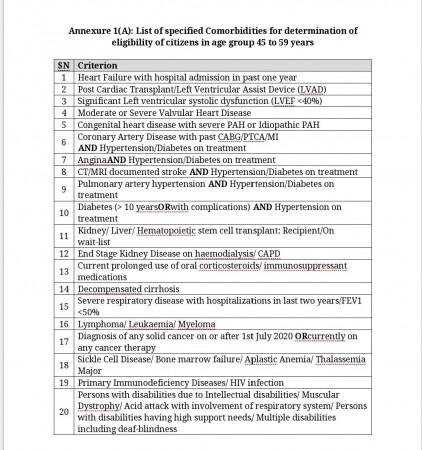As the country gears up for the second phase of Covid vaccination, the Union health ministry held an important meeting with the state governments, apprising them of the procedure of implementation of the process. In this meeting, a list of comorbidities was also unveiled by the center that can make people above 45 eligible for Covid vaccination. Notably, in this phase, all citizens above 60 years of age and those over 45 years with comorbidities will be vaccinated starting from March 1.
Here's the detailed list of comorbidities for people between 45 and 59 years of age group eligible for vaccination.
Those with severe health conditions including diabetes, asthma, cancer, AIDS, and individuals with disabilities have also been added to the list. Those who have had heart failure and been admitted to a hospital in the previous year, as well as those who have substantial left ventricular systolic dysfunction, congenital heart disorders with extreme pulmonary artery hypertension (PAH) or Idiopathic PAH, and those who have significant left ventricular systolic dysfunction will be eligible to take the vaccine. Further, many who've had a heart transplant or who have a left ventricular assist system will also be eligible.

Additionally, people with hypertension or diabetes, as well as pulmonary artery hypertension, angina, or coronary artery disorders with a history of coronary artery bypass grafting/percutaneous transluminal coronary angioplasty/myocardial infarction, or those who have had a stroke confirmed by CT or MRI, have been included in the list of eligible candidates for taking the vaccine. Those who have had diabetes for over 10 years or who have diabetes-related problems, as well as a problem with hypertension, would be considered.

Patients with end-stage kidney disease who are undergoing hemodialysis or Continuous Ambulatory Peritoneal Dialysis, as well as those with decompensated cirrhosis, are also qualified. People who have had a kidney, liver, or hematopoietic stem cell transplant, or who are waiting for one of these transplants, have also been included in the list.
Those with HIV infection or primary immunodeficiency disorders, as well as those with sickle cell disease, bone marrow failure, aplastic anemia, and thalassemia major, who has been hospitalized in the last few years, have also been included.

















